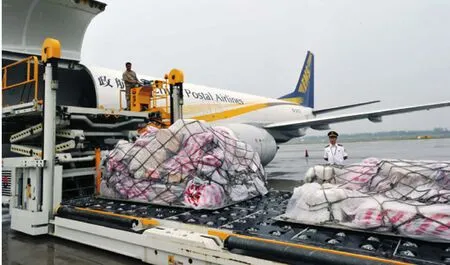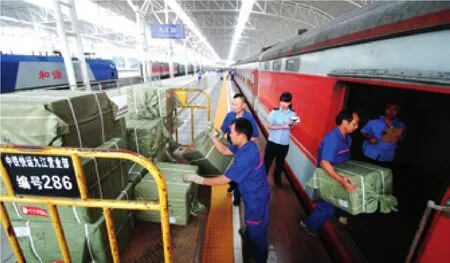Express Reform for Speedy Deliveries
2011-10-14ByLIUXINLIAN
By LIU XINLIAN
Express Reform for Speedy Deliveries
By LIU XINLIAN
The government looks to enhance the booming,yet disorganized, express delivery industry
With the rapid development of the express delivery industry in recent years, Chinese urbanites’ impressions of deliverymen have been transformed. Gone are the typical images of dark green uniformed men toting large boxes, replaced now by young, casually dressed couriers on electric bikes laden with packages.
While express services become a daily necessity with the popularity of onlineshopping, the country is gearing up to consolidate the fragmented and crowded industry. China will strive to support mergers and acquisitions between delivery companies by offering policy incentives in taxation and land use, said a guideline of the State Post Bureau of China (SPB) posted on the website on June 17. More express fi rms will be nurtured into larger ones capable of competing against international delivery service giants like UPS and DHL and with annual revenues exceeding 10 billion yuan ($1.54 billion), said the guideline.
Although China’s express delivery industry has seen rapid growth since 2005, it is far from strong compared with advanced countries, like the United States and Japan,regarding service quality, service capacity and internal management, said Ma Junsheng,Director General of the SPB.
Soaring business
In 2010, the number of express deliveries in China totaled 2.3 billion, a rise of 26 percent from 2009, with revenues hitting 57.5 billion yuan ($8.85 billion), a year-on-year increase of 20 percent, according to fi gures from the SPB.
At the end of 2010, the industry had 542,000 employees, up 35 percent from the previous year, said the SPB. The express delivery network has covered 90 percent of municipalities and provincial capitals and 80 percent of provincial-administered cities.
Express firms are mushrooming across the country as the industry picks up momentum thanks to a signi fi cant e-commerce boom.
Online retail sales almost doubled in 2010 from a year earlier to 513.1 billion yuan ($78.9 billion), said a report released by China e-Business Research Center, headquartered in Hangzhou, capital of southeast China’s Zhejiang Province.
The figure provided by China Express Association showed that the mail generated by e-commerce accounted for nearly half of the country’s daily express delivery last year.
After the Shanghai-based Yuantong Express became the delivery contractor for China’s largest C2C marketplace Taobao.com in 2006, its daily mail delivery increased from 2,000 to 280,000 over the course of three years, said Xu Jianguo, former vice president of Yuantong Express,one of China’s top four private express carriers.
The express delivery industry in China is composed mainly of foreign express giants as well as the SPB’s EMS (Worldwide Express Mail Service) and locally funded private express companies. Currently, domestic companies take up close to 70 percent of the mainland’s express delivery market,while the four international express giants,including FedEx and UPS of the United States, DHL of Germany and TNT of the Netherlands, dominate 80 percent of the express delivery service between China and the rest of the world.
Growing pains
The lack of delivery services and delays last winter are still fresh in the minds of most online shoppers. Poor weather and a migration of couriers rushing home for the Spring Festival (February 2-8) left express fi rms in desperate need of personnel to make deliveries.
This setback showed the industry’s incapacity compared with the booming e-commerce, said Xu Yong, President of Cecss.com, an express consulting website based in Shanghai.
According to a report released by the Beijing-based Zero2IPO Research Center, an equity investment consulting company, last year China’s online retail turnover increased 162.2 percent from the previous year, much faster than the 19.96 percent year-on-year increase of the express delivery industry.
The bulky e-commerce business has outpaced the delivery capacity, said the report.
For industry insiders, problems menacing the healthy development of the industry are growing more prevalent.
The vicious price war has hurt the healthy development of the whole industry,said Xu.
Nowadays a parcel weighing less than 1 kg to be shipped from Beijing to Shanghai costs only 7 yuan ($1.1), while a parcel of the same weight delivered within the same city costs 5 yuan ($0.77).
With the labor cost and fuel price hikes,the profit margin has plummeted from 30 percent in 2005 to 5 percent last year, said Xu. He attributed the startlingly low fi gures to the highly fragmented industry.
“Usually you can open an express firm by hiring two couriers, applying for a service line and buying a car. Most express fi rms in China are franchised outlets of large express delivery networks. The inadequate administration from the headquarters and fierce competition forced individual outlets to win competition through price wars,” said Xu.
According to SPB, China had registered 5,883 licensed express firms by the end of 2010. Six brands have annual revenue exceeding 2 billion yuan ($307.7million) and two have more than 10 billion yuan ($1.54 billion), compared with the 57.5 billion yuan($8.85 billion) in revenues of the whole industry.

OVERNIGHT DELIVERY: Qingdao Airport of Shandong Province has been included in a new cargo air route run by China Postal Airlines, enabling local EMS mail to arrive at any major city across China the next morning
“It shows that the express industry is too fragmented and crowded in China. The biggest four carriers in the United States occupy 95 percent of the market share,”said Yong Hu, chief representative in China of the Conference of Asia Paci fi c Express Carriers.
Ma from the SPB said China’s express industry has become big, but not strong.The number of customer complaints is also rising.
A common complaint among customers is about extended delays in deliveries before long holidays because of the companies’ increased volume of traffic and because many employees have quit their jobs for the tough work conditions and low pay. Many also complained that the companies did not allow customers to check the product unless they signed the receipt upon the product’s arrival.
In the first half of this year, the complaints over express delivery and postal service jumped 72.6 percent year on year,said the China Consumers Association.
Delivery delays, missing purchases and unregulated charges were the most complained about problems in China’s express industry, said the SPB.
Scale is key
The increasing headaches of the express industry are rooted in its fragmentation, Xu said.
“Owing to the small scale of each individual firm, they are not able to seek financial support, use mechanized sorting methods or train couriers to improve service,” said Xu.
The Zero2IPO report also showed the gap between investment in e-commerce and express industries. In 2010 and the fi rst half of this year, 115 fi nancing cases happened in China’s e-commerce industry,while there were only eight in e-commercerelated logistics.
Most express firms do not have their own fi xed assets, which makes ascertaining investment even harder, said Xu.
Up until now, no express enterprises in China have been listed. Now China Post is preparing to issue an IPO for its express delivery business, said Beijing-basedCaijingmagazine.
In attempts to reorganize the fragmented industry, policymakers have launched a crackdown on unlicensed express delivery firms. The SPB in June 2011 announced suspensions for 56 unlicensed express enterprises, mostly franchised outlets of the country’s four major express delivery networks: ZTO, Shentong, Yunda and Yuantong.
The Law of Post, passed in September 2009, stipulates that all express delivery service companies should obtain licenses before operation, setting thresholds for newcomers.
In June this year, the government initiated a guideline to hand out policy incentives for major express enterprises and encourage mergers and acquisitions. The SPB will streamline approval procedure on the mergers and acquisitions in the express industry. More incentives in fi scal and taxation policies and land use will be implemented to support these efforts.
Moreover, the government has also pledged to support express fi rms’ share listings and bond sales. The goal is to foster a batch of internationally competitive giants over the next fi ve years.
Express delivery is an emerging industry because of its great potential, said Ma. “We will take innovative measures to promote its development,” he said.

RAILWAY DELIVERY: China Railway Express workers carry parcels on to a luggage car at the Jiujiang Railway Station in Jiangxi Province
